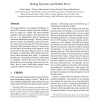Free Online Productivity Tools
i2Speak
i2Symbol
i2OCR
iTex2Img
iWeb2Print
iWeb2Shot
i2Type
iPdf2Split
iPdf2Merge
i2Bopomofo
i2Arabic
i2Style
i2Image
i2PDF
iLatex2Rtf
Sci2ools
131
click to vote
DAGSTUHL
2006
2006
Taming Dynamic and Selfish Peers
This paper addresses two important challenges for current P2P systems, namely churn and selfishness. First, we report on a system [19] whose desirable properties (small peer degree, small network diameter, etc.) are maintained in spite of ongoing and concurrent membership changes. Thereby, dynamic peers are "tamed" by redundancy. Due to the worstcase churn, this system may never be fully repaired, but always fully functional. However, it relies on the fact that peers act according to the protocol. In the second part of the paper (based on [22]), we study the impact of selfish peers which follow those protocols which maximize their utility. In particular, the efficiency of topologies formed by selfish peers is considered. We show that even in the absence of joins and leaves, the resulting system may never stabilize. How to "tame" selfish peers towards a more cooperative behavior remains an open issue. 1 CHURN Many existing file sharing systems are faced with frequen...
Related Content
| Added | 30 Oct 2010 |
| Updated | 30 Oct 2010 |
| Type | Conference |
| Year | 2006 |
| Where | DAGSTUHL |
| Authors | Stefan Schmid, Fabian Kuhn, Thomas Moscibroda, Roger Wattenhofer |
Comments (0)

